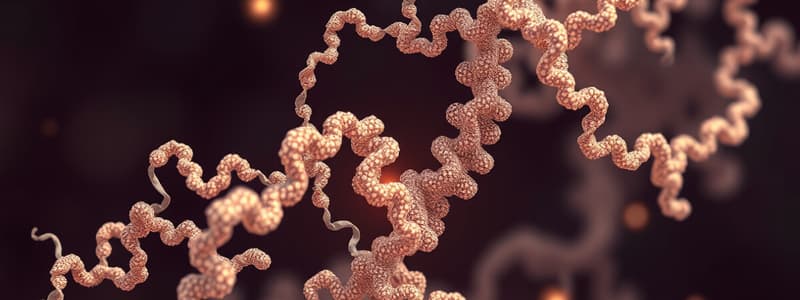Podcast
Questions and Answers
How many amino acids are there?
How many amino acids are there?
- 25
- 15
- 10
- 20 (correct)
What determines the conformation of a protein?
What determines the conformation of a protein?
Interactions between R groups of amino acids
Amino acids can be categorized into how many general categories based on their R groups?
Amino acids can be categorized into how many general categories based on their R groups?
- 4
- 1
- 3 (correct)
- 2
The charged amino acids include: _____, _____, _____, _____, _____
The charged amino acids include: _____, _____, _____, _____, _____
The polar amino acids include: _____, _____, _____, _____, _____, _____
The polar amino acids include: _____, _____, _____, _____, _____, _____
The nonpolar amino acids include: _____, _____, _____, _____, _____, _____, _____, _____, _____
The nonpolar amino acids include: _____, _____, _____, _____, _____, _____, _____, _____, _____
What is the R group of amino acids?
What is the R group of amino acids?
What type of R groups can amino acids have?
What type of R groups can amino acids have?
Which of the following R groups is nonpolar?
Which of the following R groups is nonpolar?
Which of the following R groups is acidic?
Which of the following R groups is acidic?
Which of the following R groups is basic?
Which of the following R groups is basic?
What class of amino acid is threonine expected to be in?
What class of amino acid is threonine expected to be in?
What class of amino acid is glycine in?
What class of amino acid is glycine in?
Flashcards are hidden until you start studying
Study Notes
Overview of Amino Acids
- There are 20 amino acids, each characterized by a unique R group that determines its properties and functions.
Protein Structure and Function
- Interactions between R groups influence the conformation (shape) of proteins, critical for their biological function.
Classification of Amino Acids
- Amino acids are categorized into three groups based on the nature of their R groups:
- Charged
- Polar
- Nonpolar
Charged Amino Acids
- Key charged amino acids include:
- Aspartic acid
- Glutamic acid
- Lysine
- Arginine
- Histidine
Polar Amino Acids
- Important polar amino acids include:
- Threonine
- Cysteine
- Tyrosine
- Asparagine
- Glutamine
- Serine
Nonpolar Amino Acids
- Examples of nonpolar amino acids are:
- Glycine
- Alanine
- Valine
- Leucine
- Isoleucine
- Methionine
- Phenylalanine
- Tryptophan
- Proline
R Group Characteristics
- Each amino acid has a distinct R group, influencing its classification as acidic, basic, or neutral.
Identification of Amino Acid Properties
- Valine is classified as a nonpolar R group.
- Aspartic acid and glutamic acid are examples of acidic R groups.
- Lysine is an example of a basic R group.
Specific Amino Acid Classifications
- Threonine contains an alcohol group, classifying it as a polar amino acid.
- Glycine, with a simple hydrogen R group, is categorized as nonpolar.
Studying That Suits You
Use AI to generate personalized quizzes and flashcards to suit your learning preferences.




